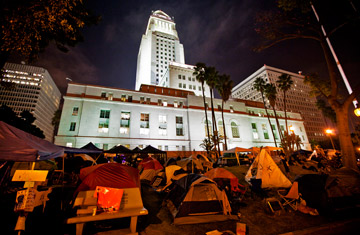
Rows of tents occupy the lawn of city hall in downtown Los Angeles on Oct. 17, 2011
Of all the protesters milling about the colorful sea of tents covering the grassy lawn outside Los Angeles' city hall, Matt Rolufs may have the toughest task. As head of the movement's "demands and objectives committee," it's Rolufs' job to figure out what the people of Occupy Los Angeles actually want. And that's not easy, even as the movement is going on four weeks of camping outside city hall, having brought some 15,000 out to a protest last week. The signs alone indicate a wide range of issues: "Drop Tuition," "Dump the Crony Do-Nothing Congress," "Wall St. = Thieves" and "Save the Humans!"
But while other Occupy movements around the country have a similar lack of direction, Occupy Los Angeles has been different. The city passed a resolution voicing support for the movement. Rolufs was thrilled when city officials said that Occupy Los Angeles had inspired them to move forward on a policy initiative to demand accountability from big banks. While protesters in other cities have battled with the police, Los Angeles is letting around 700 people spend the night on city hall's lawn even though it's against the law. Mayor Antonio Villaraigosa even handed out ponchos to campers during a rainstorm. But the city council went even further in its resolution by urging implementation of a proposal known as the Responsible Banking program because it would address some of the protesters' concerns. "Isn't that great?" says Rolufs, 38, a software engineer who drives 40 miles from work to Occupy Los Angeles to run the committee every day. "The people came together and raised their pitchforks in the air, and as a result we're the impetus for change."
First introduced more than two years ago, the proposal had lost steam until the zeal of Occupy Los Angeles gave it momentum, according to its sponsor, councilman Richard Alarcon. "We felt the resolution kind of captured the spirit of the entire movement," Alarcon says. "We were sort of kindred spirits." If implemented, the initiative would set up a report-card system to rate banks and deny them business if they score too low. Banks' scores would be determined by factors such as the number of home-loan modifications they give to homeowners to prevent foreclosures, how much lending they do to small businesses and whether the institutions have committed fraudulent activity. And there is reason to suspect fraud. In 2008, the city of Los Angeles filed a lawsuit against 35 financial institutions alleging wrongdoing like rigging bidding processes to manage city debt. The suit has yet to be settled as the city waits for state and federal investigations to conclude amid similar accusations in other cities. "If we find that companies are bid rigging and defrauding the city's taxpayers out of money with their actions, then why should we do business with them?" Alarcon says.
Still, some city officials warn cutting ties with banks may not be a good idea. In a memo sent to the mayor this week, city administrative officer Miguel Santana issued a note of caution that jettisoning some of the underwriters for the city's bond deals could cost the city more than $50 million as it would spur higher interest rates and termination fees. That would jeopardize funding for planned public-works projects such as the replacement of a downtown bridge that has failed earthquake tests, a parking structure and reptile-and-amphibian zoo exhibits, Santana said. And it wouldn't come at a good time, as the city already projects a $250 million deficit for next year amid lower tax revenue. "The issue that we're raising here is that the policy discussion can't be held in isolation to the more pragmatic issues of having to borrow money," Santana said in an interview. Local blog LA Observed chimed in, calling a plan to end deals with lenders "misguided and irresponsible." Councilman Bernard Parks, chair of the budget committee, also noted that it's too early to accuse banks of fraud since the city's lawsuit is still in progress. In addition, he says, the city may not have the capacity to rate and regulate the banks. "I don't know if we have city employees that can pore through bank records to see how they're dealing with foreclosures," he says.
Those objections don't hold water with the protesters, though. They're calling for a sea change in the financial system, and they see any measure that's tough on the banks as a good start. "I'm sure it'd be nice to go see reptiles at the zoo or a new bridge, but is that really the most important thing right now?" Richard Florence, 33, a fashion designer, said inside a tent in front of city hall. "Why don't we hold those doing wrong accountable? Instead of being afraid we won't get money, let's do something bold." With the protesters literally at its doorstep, the city's budget committee has until next month to make a decision on the plan.
